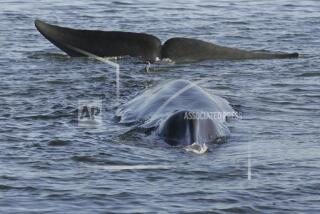Norway, Iceland to Hunt Whales Again : Ecology: They will defy a ban on commercial catches by letting their fleets go after one species. The U.S., Britain and environmentalists protest.
LONDON â Norway and Iceland, two of the worldâs biggest fishing nations, announced plans Monday to defy a 7-year-old international ban and resume commercial whaling.
The decision set off protests from environmentalists and officials of the United States and Britain.
Norwegian Prime Minister Gro Harlem Brundtland said in Oslo that her country would resume hunting next year for minke whales, one of the smallest and most numerous of the species. Brundtland, a prominent environmental spokeswoman, said she was prepared for harsh international criticism of the decision, which her government made under pressure from its powerful fishing industry.
Iceland announced that it was quitting the International Whaling Commission so it too could resume hunting minke whales. Icelandâs ambassador to Britain said the commission, which opened its annual meeting in Glasgow, Scotland, on Monday, had become a captive of anti-whaling interests.
John Knauss, the U.S. representative to the commission, said he was âshocked and disappointedâ by the Norwegian decision, which he said would âseriously undermine the structure of the only global body with authority to manage whaling.â
âThey didnât even give us the five days of this meeting to see if we could make progress in meeting their objections,â Knauss said.
British Fisheries Minister John Gummer, in his opening address to the meeting, made clear that the moves by Norway and Iceland would not compel the commissionâs 35 other member states to lift the ban. âThe world will not allow us to risk a return to the barbarity of the past,â he said. âI firmly believe that the burden of proof for lifting the moratorium must rest with those who say they want to continue with whaling.â
Whales are the largest and among the most intelligent of mammals, and their preservation has become a symbolic environmental issue. A commission-generated cessation on hunting that took effect in 1985 banned the killing of all 12 âgreat whaleâ species because of the threat of extinction.
The ban permitted Norway, Iceland and Japan to continue killing several hundred whales each year for âscientific researchâ and allowed subsistence whaling by aboriginal groups in four countries.
Environmentalists contend that modern whaling, which often uses explosive harpoons and electric shock to snare and kill, is among the most brutal forms of mammal hunting. The conservationists, dozens of whom stood outside Mondayâs session holding anti-whaling placards, also allege that whaling countries have used scientific research as a smoke screen to conceal commercial hunting.
Since it agreed to the cessation, the commission has been engaged in a scientific assessment of how many whales remain in each of the 12 species. It has estimated a minke whale population of 860,000, but the accuracy of the estimate is in dispute.
Japan, Norway and Iceland are pressing to revise the commissionâs procedures to allow limited commercial minke whaling. In opposition, France has tabled a plan to create a new whale sanctuary in the Antarctic that would cut off that major whale feeding area from the hunters.
U.S. representative Knauss said he supports revising the commissionâs procedures for determining how many whales each country will be allowed to kill if and when the ban is lifted, while suspending judgment on whether to remove the ban until next yearâs session. That stand has placed him in conflict with environmentalists, who contend that there should be no easing of the restrictions.
More to Read
Sign up for Essential California
The most important California stories and recommendations in your inbox every morning.
You may occasionally receive promotional content from the Los Angeles Times.










